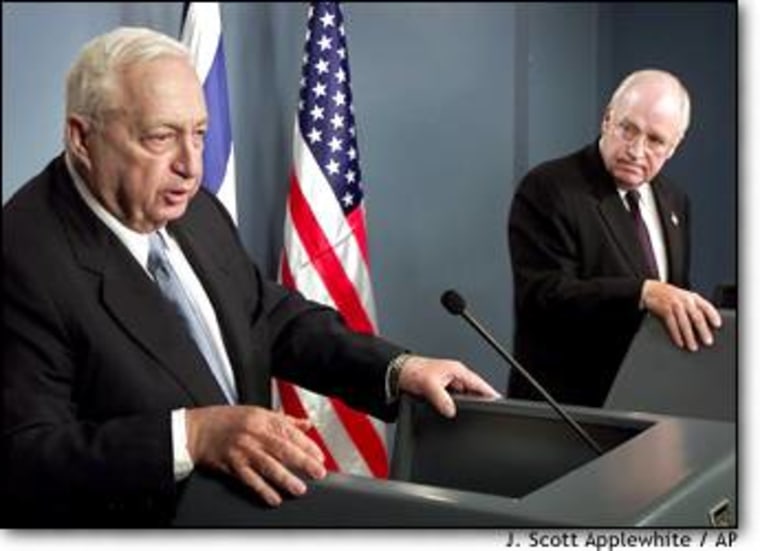Was it the death of nine-month-old Avia Malka that made the difference? Or, perhaps, the tank shell that snuffed out the 6-year-old life of Abed-Rabbu Saleh. Maybe there was a magic number: 1,200 deaths? Or maybe just 40 or more in any one week? Whatever the trip wire, the Bush administration finally appears to have jettisoned the “benign neglect” approach to Middle East peacemaking it brought to Washington in January, 2001. Now it has acknowledged a reality that every president since Richard Nixon has had to learn the hard way: unless the United States twists arms in the Middle East, the blood will continue to flow.
THE SHAMBLES THAT IS America’s Middle East policy certainly has more than one cause, and there is no guarantee that anything the United States does will ever bring a comprehensive peace between Israel and the Palestinians.
Consider the main obstacle: poor leadership. Palestinians may be the worst-led people on the planet, and the Arab leaders who claim to support Yasser Arafat often do so only to cloak their own lack of legitimacy at home (See: Saddam Hussein). Meanwhile, Arafat’s one real piece of credibility - that he spoke for the Palestinian people - has been shattered by the Hamas and Islamic Jihad violence that he claims to be unable to halt. Whether that is part of a double game or not, it suggests that Arafat’s role as a guarantor of peace is pretty tenuous.

On the Israeli side, things are no better. Those actually interested in Middle East peace, as distinguished from those who like to use the word to mask other agendas, have found Israeli Prime Minister Ariel Sharon’s policies to be disastrous. Sharon never wanted the Oslo peace accords to be signed and he opposed every compromise Israel agreed to during the five years of relative calm brought by the peace process. This is not an assertion or some closely held secret. Sharon campaigned against the process publicly all through the 1990s, even casting his hawkish fellow Likud Party colleague Benjamin Netanyahu as a man who was selling out his nation. (Netanyahu’s sin: merely stalling the peace process, rather than destroying it.)
Now in office well over a year, Sharon talks the talk of peace occasionally, and particularly when American vice presidents are in town. But who is really surprised that these two men, Arafat and Sharon, have brought their peoples to such a horrible crossroads?
CHANGE IN THE WIND?
Today, 14 months after taking office, the Bush administration finally seems to agree that American policy has to consist of something more than saying “the parties need to make maximum efforts now to create the quiet, to get that unconditional cessation of violence,” which is how State Department spokesman Richard Boucher put it last July.
Clearly, “the parties” have failed. After decades of bloodshed and tragedy, the “parties” themselves are about as ill-suited to reason as any two sides can be. They also have proven to the world and each other that they will not shrink at the prospect of more violence; indeed, if anything simple can be said about this region, it is that violence always breeds violence.
The United States must take its share of the blame for allowing things to get so out of hand, however. The Bush administration made a terrible error by allowing Sharon to equate the suicide bombings of Israeli discos and shopping centers with the airliner attacks of Sept. 11. The question is not whether they are equally horrific; the question is why they were carried out. Viewed in that light, the comparison is not only flawed, but rather insulting to the United States.
Still, week after week since Sept. 11, Sharon and his cabinet spokesmen have driven home the idea. “A terrorist is a terrorist is a terrorist,” Sharon said this week, clearly seeking to meld the image of Arafat with that of Mohammad Atta in American minds.
That is tremendously intellectually dishonest. Israel knows this from experiences. For instance, Hizballah, which fought Israeli troops to a standstill in Lebanon, is a dramatically different beast from Hamas, which uses suicide bombers to murder civilians. Similarly, Atta and his henchmen are a completely different species from, say, the Corsican nationalists who assassinate French officials on that island.
The Bush administration appeared to bristle at Sharon’s definition of things days just after the World Trade Center and Pentagon attacks. There was even some indication early on that, far from giving Israel a green light to go after Arafat, Washington was going to insist that the Sharon government put a lid on the conflict.
A QUESTION OF MOTIVE
After all, unlike Israel, the United States does not rule millions of Arabs with an occupying army, nor does it claim any part of the Arab world as its own territory. The United States, in fact, was targeted because it represents to men like Osama bin Laden an insurmountable obstacle to the spread of fanatical Islamic ideology, and at least in part because of its defense of Israel over the years.

This should have won Washington some consideration. Indeed, there even was precedent for the United States requesting that Israel restrain itself. During the Gulf War, when George Herbert Walker Bush was trying to forge an alliance with willing Arab partners, it was necessary to win Arab support to win the war on terrorism. In 1990, Israel’s government understood that the greater good would be served if it restrained itself. And to its credit, Israel stayed out of the Gulf War even after being hit by Iraq’s ballistic missiles.
The philosophical argument proved too much for the second Bush administration in 2001, however. By mid-March 2002, after months of prodding the “two parties” to settle down, the suicide bombings in Israel and the outright warfare waged by Israeli troops in the West Bank and Gaza finally forced some action from Washington.

The United States, via Vice President Dick Cheney, finally this week began to put real pressure on Sharon to give negotiations a chance. Neither Washington nor Sharon’s government relishes the prospect of resurrecting Arafat’s reputation yet again, but the alternative so far appears to be outright massacres by one side against the other.
Why did it take so long for George W. Bush to get religion on this issue? Partly, the answer lies in the Bush team’s general feeling before Sept. 11 that the world was going to be a distraction from more important issues — like energy, Social Security reform and economic policy.
“Benign neglect,” is the way Israel’s consul general in New York, Alon Pinkas, described the new administration’s Mideast policy to me in March 2001. Like Bill Clinton in 1993, George W. Bush came to Washington promising to concentrate on America’s domestic problems while being “more humble” abroad. Also like Clinton, he inherited conflicts that he sought to avoid at all costs. For Clinton, it was Somalia and Bosnia. For Bush, it was the Palestinians and Israelis.
Sept. 11 interrupts this neat little analogy, of course, but this point remains valid. American presidents come to office generally thinking that their involvement in foreign affairs is a matter of personal choice. They dip in often as much for reasons of domestic politics (to please a constituency, to burnish resumes or to run from scandal) as they do for American interests in the wider world. What they don’t often understand quickly is just how much the rest of the planet depends on the American president’s willingness to wade into the more difficult conflicts, whether the conflict is Kosovo, Kashmir or the Middle East. Hopefully, the current president has now taken this to heart.
Mail your thoughts to Michael Moran, request to join (or be removed from) his email notification list.
